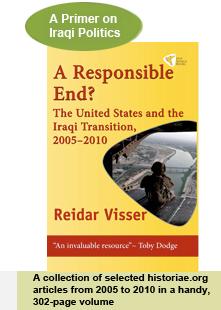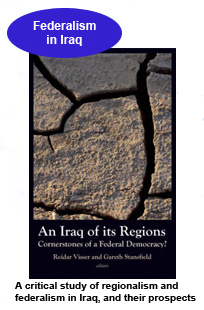



| Main | |
| Documents & images | |
| Links | |
| Contact | |
 | |
| amazon.com |

|
|
|
amazon.com
amazon.co.uk |
|

|
|
|
amazon.com
amazon.co.uk |
|
The Completion of the Maliki Government on 8 June 2006
By Reidar Visser (http://historiae.org)
9 June 2006
[Addendum to an earlier article dated 20 May 2006 on the Maliki government and the situation in Basra.]
The tension in Basra was given widespread media attention on 30 May 2006 when the Iraqi prime minister, Nuri al-Maliki, travelled to the Gulf city to impose a state of emergency. Reports from Basra have tended to take at face value Maliki’s description of the problem as rivalry between “criminal gangs”; alternatively, journalists have focused on the plight of the Sunni minorities in the Zubayr and Abu al-Khasib areas – a theme that receives extensive coverage in the pan-Arab media. But the crucial intra-Shiite tension at the heart of the conflict, principally between the Fadila Party and the Supreme Council for the Islamic Revolution of Iraq (SCIRI), has largely remained in the background. This despite the important ideological conflict involved as regards competing visions of Basra’s future in a federal Iraq: Fadila has inclined towards small-scale regionalism limited to the far south of Iraq only, whereas SCIRI has promoted the idea of a single Shiite super-region from Basra to Baghdad. In fact, these tensions came to the surface at the height of the crisis, when an ally of the Fadila from a local Daawa breakaway faction repeated the well-known accusation that the (Shiite) central government neglects Basra, “even though Basra finances all of Iraq [from its oil income]”.
To some extent, it could seem as if Nuri al-Maliki’s actions are an attempt at isolating recalcitrant Fadila elements in Basra. In the security committee set up to deal with the problem, there was at first no Fadila representation. On the other hand, the ex-minister of transport, Salam al-Maliki, a Sadrist from Basra, was included in this committee from early on, suggesting that he still enjoys the trust of the prime minister. Salam al-Maliki notoriously declared his intention to separate Basra from Iraq during the Muqtada al-Sadr crisis in August 2004 but was subsequently was promoted to the rank of minister in 2005; he has since worked within the framework of the existing system – in contrast to the more confrontational Fadila.
Nuri al-Maliki completed his government on 8 June, and two of the three appointments are of particular interest to Basra because they may have further effects both on intra-Shiite struggles and on the battle over competing federal models for southern Iraq. One possible consequence of the appointment of Jawad al-Bulani as minister of the interior could be a rapprochement with certain segments within the Fadila (some Fadila members have had good relations with Bulani in the past) and thereby a further isolation of those Fadila elements in the south who remain at odds with the government. Generally seen as an “independent”, Bulani has in past years been quite close to Ahmad Chalabi, on whose coalition list he participated in the last elections. He was also one of the few males in the Islamist camp to sign a charter framed in the defence of the rights of women and aimed at preserving the secular personal status law alongside the religious codes. Other past associates include Abd al-Karim al-Muhammadawi, leader of the Hizballah movement which historically has been strong in the southern marshlands. Bulani’s ascendancy (instead of for instance a SCIRI appointment) might have a conciliatory effect both on independents within the United Iraqi Alliance and on certain groups within the Fadila.
The appointment of Shirwan al-Waili of Nasiriyya as national security adviser is also interesting. He belongs to the Tanzim al-Iraq branch of the Daawa Party and was in 2005 at one point openly associated with the “southern” discontents within the United Iraqi Alliance. At the same time, he has been a very active and vocal member of parliament, and he has clearly been interested in working within the government. His cooptation into the government means that Maliki now has at his disposal several ministers whom he can send to Basra and the south without fearing accusations of “northern” discrimination. At fact, the number of “sons of the south” (abna’ al-janub – here,“south” corresponds to what Westerners normally consider the “far south”) in positions of power in Baghdad is today probably larger than at any point in Iraqi history.(1)This could take some wind out of the sails of the regionalist current in Basra, but ultimately the real test will be about policy and not about personalities. Basrawis will continue to dislike discrimination of their city – whether it is carried out by Baghdadis, Najafis, or indeed by their own fellow townsmen.
NOTE
1.To the account of southerners given earlier can be added the electricity minister, the UIA independent Karim Wahid al-Abbudi, who was born in Nasiriyya, and the Daawa (Tanzim al-Iraq) education minister, Khudayr al-Khuzai, from Maysan.
This document may be freely reproduced as long as http://historiae.org is credited as the source.
